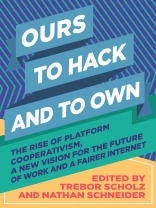A Wired Magazine Top Tech Book of 2017
Real democracy and the Internet are not mutually exclusive.
Here, for the first time in one volume, are some of the most cogent thinkers and doers on the subject of the cooptation of the Internet, and how we can resist and reverse the process. The activists who have put together
Ours to Hack and to Own argue for a new kind of online economy: platform cooperativism, which combines the rich heritage of cooperatives with the promise of 21st-century technologies, free from monopoly, exploitation, and surveillance.
The on-demand economy is reversing the rights and protections workers fought for centuries to win. Ordinary Internet users, meanwhile, retain little control over their personal data. While promising to be the great equalizers, online platforms have often exacerbated social inequalities. Can the Internet be owned and governed differently? What if Uber drivers set up their own platform, or if a city’s residents controlled their own version of Airbnb? This book shows that another kind of Internet is possible—and that, in a new generation of online platforms, it is already taking shape.
表中的内容
Something to Say Yes To
1. Nathan Schneider and Trebor Scholz: What This Is and Isn’t About
2. Nathan Schneider: The Meanings of Words
3. Trebor Scholz: How Platform Cooperativism Can Unleash the Network
4. Susie Cagle: The Seven Cooperative Principles
5. Jessica Gordon Nembhard: Eight Facts about Cooperative Enterprise
Platform Capitalism
6. Douglas Rushkoff: Renaissance Now
7. Juliet Schor: Old Exclusion in Emergent Spaces 8. Mc Kenzie Wark: Worse Than Capitalism
9. Steven Hill: How the Un-Sharing Economy Threatens Workers
10. Christoph Spehr: Sponge Bob, Why Don’t You Work Harder?
11. Kati Sipp: Portable Reputation in the On-demand Economy 12. Dmytri Kleiner: Counterantidisintermediation
13. David Bollier: From Open Access to Digital Commons
An Internet of Our Own
Showcases: Cooperative Platforms
14. Yochai Benkler: The Realism of Cooperativism
15. Janelle Orsi: Three Essential Building Blocks for Your Platform Cooperative
16. Caroline Woolard: So You Want to Start a Platform Cooperative
17. Melissa Hoover: What We Mean When We Say “Cooperatives”
18. David Carroll: A Different Kind of Startup is Possible
19. Marina Gorbis: Designing Positive Platforms
20. Cameron Tonkinwise: Convenient Solidarity: Designing for Platform Cooperativism
21. Seda Gurses: Designing for Privacy
22. Danny Spitzberg: How Crowdfunding Becomes Stewardship
23. Arun Sundararajan: Economic Barriers and Enablers of Distributed Ownership
24. Ra Criscitiello: There is Platform-Power in a Union
25. Saskia Sassen: Making Apps for Low-wage Workers and Their Neighborhoods
26. Kristy Milland: The Crowd: Naturally Cooperative, Unnaturally Silenced?
27. Tom Slee: Platforms and Trust: Beyond Reputation Systems
28. Michel Bauwens and Vasilis Kostakis: Why Platform Co-ops Should Be Open Co-ops
Conditions of Possibility
Showcases: infrastructure
29. John Duda: Beyond Luxury Cooperativism
30. Brendan Martin: Money is the Root of All Platforms
31. Carmen Rojas: From People-Centered Ideas to People-Powered Capital
32. Karen Gregory: Can Code Schools Go Cooperative?
33. Palak Shah: A Code for Good Work
34. Micky Metts: Meet Your Friendly Neighborhood Tech Co-op
35. Michael Peck: Building the People’s Ownership Economy through Union Co-ops
36. Mayo Fuster Morell: Toward a Theory of Value for Platform Cooperatives
37. Francesca Bria: Public Policies for Digital Sovereignty
38. Miriam Cherry: Legal and Governance Structures Built to Share
39. Rachel O’Dwyer: Blockchains and Their Pitfalls
40. Astra Taylor: Non-Cooperativism
Contributors
Acknowledgments
关于作者
Nathan Schneider is a Scholar-in-Residence of media studies at the University of Colorado, Boulder. He has written for Harper’s, The Nation, The New York Times, The Catholic Worker, and other publications.












